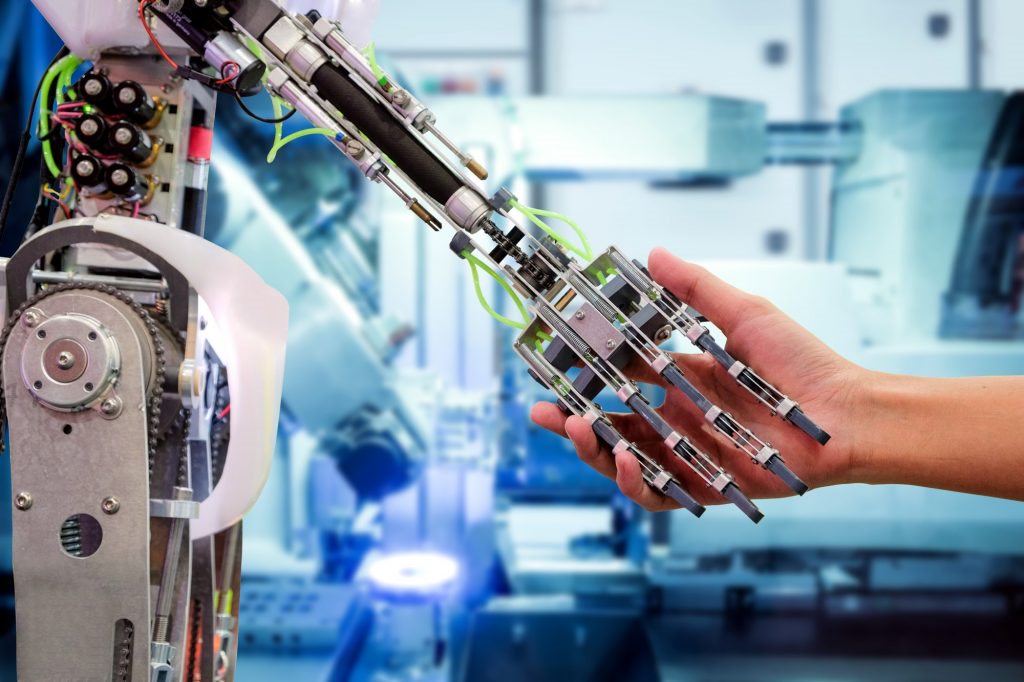EDIHs: accelerating digitization
Together with sustainability (Green Deal), digitisation is the most important pillar of the current European Union strategy. As part of the 'Digital Europe Programme', there will be a network of approximately 150 regional European Digital Innovation Hubs (EDIH). The aim of the EDIHs is to accelerate and broaden the digitalisation of the regional economy. To do this, each EDIH must organize and offer services, some of which are mandatory. In addition, each EDIH must build up its own specialisation to be shared with other EDIHs to create a strong European ecosystem for digitisation. EDIHs (budget: 1.8 million per year) are financed for seven years by the EU (40%), the national government (40%) and the region (20%). After this point, they must be able to operate independently. The EU offers many services to support EDIHs in their role as catalysts for digitisation.
The Netherlands opts for industrial EDIHs
The Netherlands will operate five EDIHs, one of which will be in the north, and each will build on the existing regional Smart Industry Hubs. Our country has therefore opted for an industrial implementation of the EDIHs. There will also be one EDIH with a focus on the public sector. The Dutch EDIHs will work closely together through a back office, an underlying Smart Industry programme and a shared approach to the various EDIH services. The specializations will also be coordinated at national level.
EDIH Northern Netherlands: catching up and positioning for the future
Although the public sector in the north is one of the frontrunners when it comes to digitalization, the industry overall is lagging behind considerably. This is not without risk, as industry is and remains an essential part of the Northern revenue model. Digitalization offers unprecedented opportunities, but companies need to participate. In this context, EDIH Northern Netherlands (EDIH-NN) is simultaneously working to clear backlogs (using generic services for digitalization) and create a strong position for the future.

Specialization for autonomous systems
In addition to generic services to accelerate digitisation in companies, the EDIH-NN will devote extra focus on autonomous systems (see box), in particular to support the four key transitions that need to be made in order to achieve the desired sustainability of our economy: (1) Smart Agro, (2) Factory of the Future, (3) Life Sciences & Health and (4) The Built Environment, Utilities (especially energy) and Mobility. EDIH-NN reinforces the previously adopted Northern innovation strategy, described in the RIS (Regional Innovation Strategy). The Northern Netherlands is a true transition economy, and autonomous systems play a key role in this. By strengthening ourselves further in this area, we can create a continuous flow of new opportunities for companies and generate enthusiasm. The Northern Netherlands has sufficient basic expertise within the knowledge institutes and companies to develop into a national and international leader in this field. Over the next seven years, this knowledge base will be expanded through the EDIH-NN.
In addition to opting for autonomous systems, EDIH-NN applies a number of criteria to create maximum leverage. It focuses on (a) stimulating the leading companies (companies with supra-regional sales), (b) on companies that are part of the value chains (development, production and application) of autonomous systems and (c) the underlying services in the transition areas mentioned.
Autonomous systems play a key role in solving societal challenges
Autonomous systems are commonly known as self-propelled transportation devices such as drones or self-driving cars that can navigate without human intervention and respond to unforeseen circumstances. Conceptually, it is an advanced organizational concept from measurement and control engineering - made possible by advancing technology. A system performs a certain function, such as dehydrating milk or performing a bypass operation. The term autonomous systems refers to when this function can be performed independently, i.e. without human intervention. To do this, it must have built-in intelligence so that it can observe and correct itself autonomously. In terms of complexity, this can range from relatively simple functions such as controlling a traffic junction to very complex, such as complex production lines or operating robots. Complex systems are extremely sensitive, self-learning, involve multiple functionalities (system of systems) or are based on feed forward control. Society is becoming increasingly complex. Autonomous systems meet the need for better (more robust, higher level) control of this complexity.
How will the EDIH-NN work?
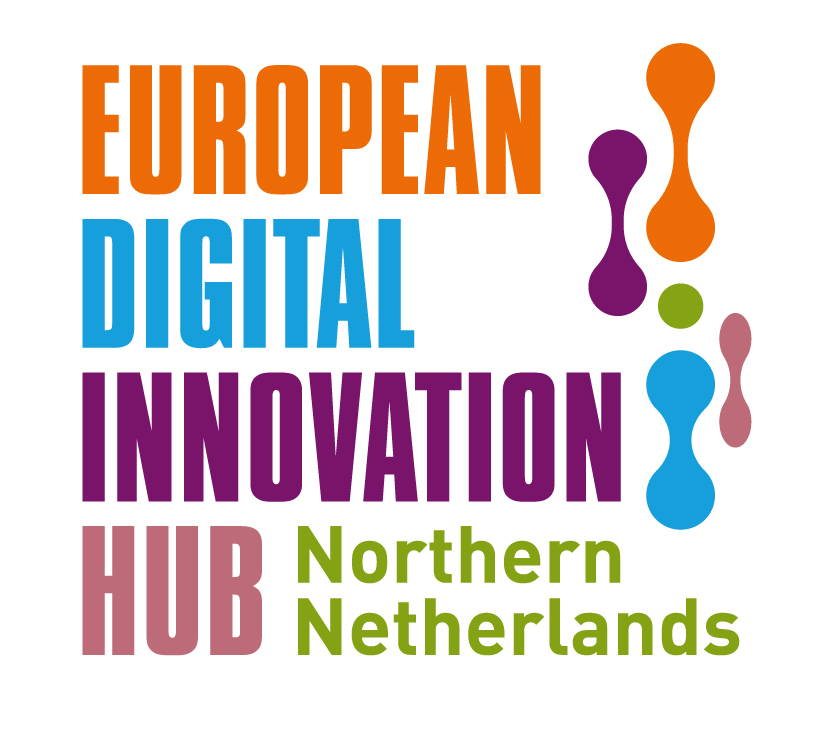 All EDIHs will work according to a pre-defined program with specializations for regional situations and choices. This results in an extensive work program for the EDIH-NN.
All EDIHs will work according to a pre-defined program with specializations for regional situations and choices. This results in an extensive work program for the EDIH-NN.
- A Smart Factory Accelerator that provides companies that are (or will be) active in the world of autonomous systems with structural support in digitalization. The Accelerator consists of an assessment with follow-up activities to support companies (coaching, master classes, development of a roadmap, etc.). This approach has been developed within the Smart Industry Hub. The successful Assessment of the Smart Industry Hub is being extended to autonomous systems.
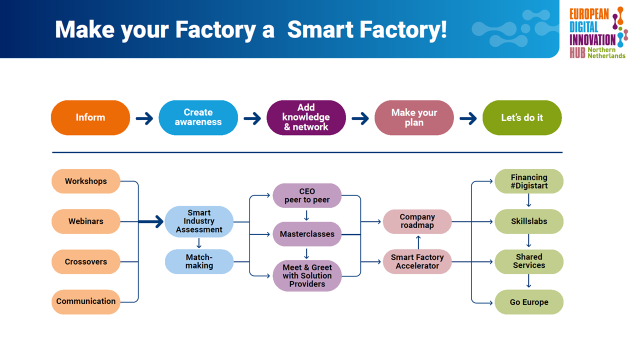
- A 'Test Before Invest network' that gives companies low-threshold access to test and demo facilities and thus enables them to digitise faster. EDIH-NN will achieve this through a new cluster of approximately 20 organisations in the north which will focus on applications of autonomous systems in their own field, and together, via the EDIH network, will showcase themselves as a European test lab.
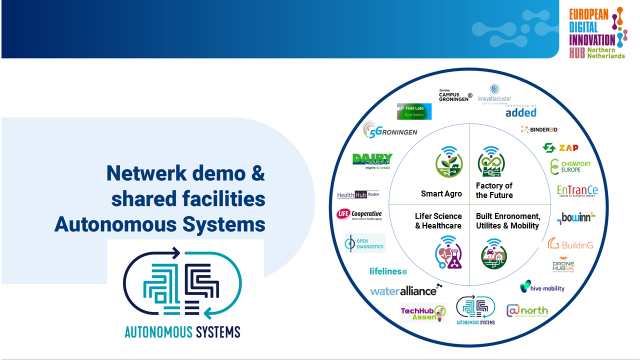
- An Entrepreneurs' Desk where companies can go with questions about digitization. This counter is run by front-line organizations Ynbusiness (Friesland), GroBusiness (Groningen) and Ik Ben Drents Ondernemer (Drenthe). The supply side has also been organized. Fundamental questions are submitted to knowledge institutions, action-oriented questions go to Solution Providers and more application-oriented questions to students of the Digital Innovation Workshops (HBO) and the Workshops for Digital Professionalism (MBO). Special provisions have been made for specific support in the field of DEP Technologies (Cyber Security, Artificial Intelligence and High Performance Computing), which the EU considers important.
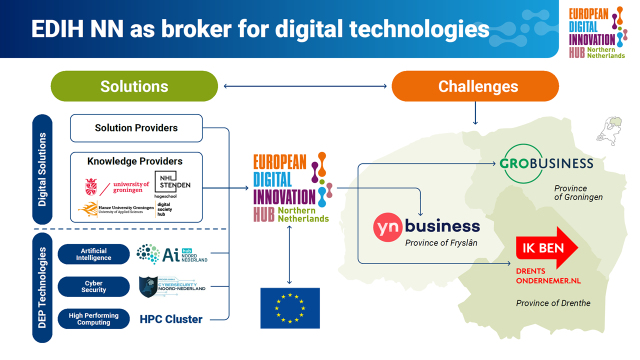
- A skills program for companies related to digital technologies that are prioritized within Digital Europe. These are Cyber Security, Artificial Intelligence and High Performance Computing. Students, knowledge institutions and Solution Providers play an important role in the implementation of this skills programme.
- The northern branch of the Smart Makers Academy as a new national learning concept to regroup existing educational resources (and supplement them if necessary) and offer them to students as individual learning paths, with a pilot for education around autonomous systems.
- Additional financial services, such as a Funding Readiness Support program to strengthen the financial feasibility of digitization plans. The possibilities for a funding scheme (#Digistart) are also being investigated. This 'support to find investment' approach will be rolled out nationwide.
- A competence development program to make the Northern Netherlands a European leader in autonomous systems. This program consists of:
- matchmaking to identify, activate and bring together supply and demand for autonomous systems, both within the north and between the north and the rest of the EU.
- portfolio management to build and strengthen the technologies and competences in the collective companies and knowledge institutions that are needed to become frontrunners.
- activities to profile the Northern Netherlands in the European EDIH network and to encourage companies and organisations to join European initiatives, including the major innovation programs, again with a focus on autonomous systems.
Seeing and being seen
The European ecosystem for digitisation is based on the exchange of knowledge and expertise between European EDIHs. It is important to be recognised and acknowledged in this as a region. The Northern Netherlands can provide an attractive proposition for autonomous systems built around:
- Our joint testing ground that other EDIHs and companies can turn to for expertise and demo and test facilities for autonomous systems in the required transitions.
- An approach to organizing supply of High Performance Computing that enables industrial SMEs to deploy shared services more quickly around data sciences, leading to significantly lower thresholds for digitization.
- Our Smart Factory Accelerator with its underlying toolbox, including the successful Smart Factory Assessment - especially interesting for EDIHs in traditional industrial regions.
Focal point
The plan for the Northern EDIH was devised by the Investment and Development Agency for the Northern Netherlands (NV NOM). 40 organisations were involved with the start of the Northern EDIH, from employer organisations to educational institutions. All EDIHs in Europe form a large network which will be working together to carry out the Digital Europe Programme. The five Dutch EDIHs will also be working together closely via a shared back office.
